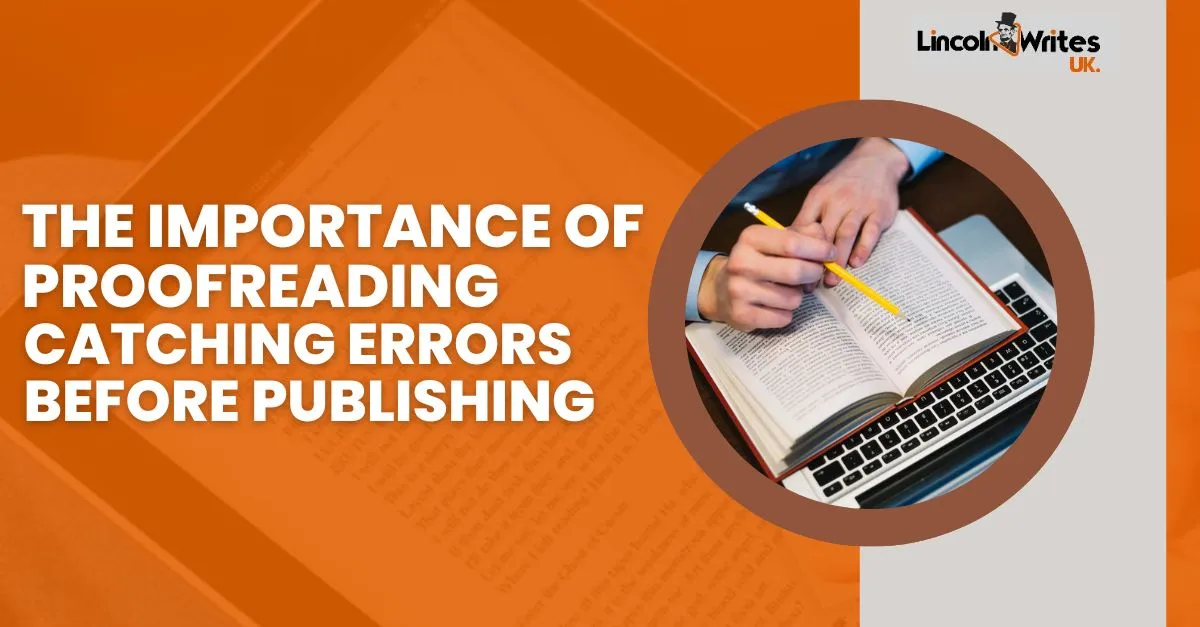When it comes to writing, most people assume that writing is the toughest part of the process and they’re finished. But that’s not the case. Even after you’re done with the manuscript, it’s still not publish-ready, if you still haven’t proofread it yet.
Sure, you may think you didn’t make any mistake while writing, but just skim a few pages after a while and you’ll find it littered with typos, awkward phrasing, and layout blunders. The importance of proofreading goes far beyond catching the occasional spelling mistake. It’s about protecting your reputation, creating a seamless reading experience, and ensuring that every detail, from punctuation to layout, is on point.
Whether you’re self-publishing, working with the top ebook publishers UK, or considering a hybrid model, proofreading should never be treated as an afterthought. In this post, we’ll explore why proofreading matters, the most common grammar mistakes authors overlook, and how professional book proofreading services can help polish your manuscript to perfection.
Proofreading vs Editing: What’s the Difference?
Before diving in, let’s clarify a common confusion.
- Editing focuses on improving content, structure, flow, and clarity.
- Proofreading is the final polish. It catches surface-level issues, spelling, punctuation, formatting, and layout problems.
If editing is about shaping the clay, proofreading is smoothing it down before firing it in the kiln. It’s your last chance to catch mistakes before they go public.
This is true whether you’re producing fiction, nonfiction, or niche work like technical ghostwriting or children’s book ghostwriter projects, both of which carry their own proofreading challenges.
Why Proofreading Is Non-Negotiable
1. It Preserves Your Professionalism
Readers today are savvy. A single typo on page one can break immersion. Worse, it can lead to negative reviews and poor ratings, even if your story or message is brilliant.
That’s especially important if:
- You’re launching a brand
- Hoping to attract media or publisher attention
- Using your book to support speaking or consulting work
In all these cases, errors signal carelessness. That’s the last thing you want associated with your name.
2. It Respects the Reader’s Experience
Readers invest time (and money) in your book. A clean, polished manuscript honours that investment. It allows them to focus on your ideas, not your misplaced apostrophes. In genres like memoir or ghostwritten series planning, where emotional tone and consistency are key, even small mistakes can pull readers out of the moment.
3. It Reduces Your Risk of Publishing Embarrassment
Once your book is live, fixing errors isn’t as easy as it sounds, especially if you’re dealing with print editions, ISBNs, or have already started marketing. You might need to:
- Re-upload your ebook
- Notify distributors
- Update promotional materials
The Most Common Mistakes Proofreaders Catch
Even the best writers make small errors. That’s what proofreaders are for. Here are just a few examples of what they typically catch:
- Typos and misspellings (e.g., “form” instead of “from”)
- Inconsistent hyphenation (e.g. “ebook” vs “ebook”)
- Misused homophones (e.g. “their” vs. “there”)
- Common grammar mistakes (subject-verb agreement, tense shifts)
- Missing punctuation (or too much of it…)
- Layout errors (extra spaces, incorrect indentation, bad page breaks)
- Incorrect headers or footers in print formats
- Broken links in ebook formats
- Repeated words or phrases that jar the flow
And yes, these issues show up in every type of manuscript, from collaborative writing vs ghostwriting projects to solo-authored nonfiction and even poetry.
Ebook vs Print: Unique Proofing Challenges
Proofreading ebooks vs print brings its own set of complexities.
For print, you’re watching out for:
- Page numbers and running headers
- Proper spacing between paragraphs
- Consistency across chapter headings
- Print bleed and margins (for physical printing)
For ebooks, the priorities shift to:
- Text flows across devices
- Clickable navigation
- Correct use of italics and bold
- Metadata visibility and typos in eBook metadata optimisation
- Broken or misdirected links
A professional proofreader will know how to approach each format differently, ensuring both your print and digital editions are clean and error-free.
Should You Proofread Your Own Book?
In theory? Yes. In practice? Not alone.
You should proofread your manuscript several times during drafting and post-editing. But your brain is too familiar with your own writing. You’ll skip over repeated words, miss incorrect phrasing, and mentally autocorrect typos.
That’s why it’s essential to choose the right proofreader, someone with a fresh perspective and a trained eye.
Human vs AI Proofreading
Spellcheck is helpful. So is Grammarly. But they’re not enough.
Here’s why human vs AI proofreading is a clear win for humans:
- AI doesn’t understand context
- It can flag correct sentences as errors
- It misses subtle tone issues or character voice quirks
- It can’t check layout or visual formatting in manuscripts
- It won’t spot repeated ideas or awkward transitions
Use AI for a first pass. But never publish without a human final review, especially when preparing for submission to the top ebook publishers in the UK or releasing a book under your professional brand.
What Makes a Great Proofreader?
A quality proofreader should:
- Have experience in your genre or niche
- Understand regional language differences (UK vs US English, for example)
- Be detail-obsessed
- Work with trackable changes
- Communicate clearly and professionally
At Lincoln Writes UK, our book proofreading services include genre-specific experts, so whether you’re publishing romance, research, children’s literature, or something technical, you get tailored support.
When to Schedule Your Proofread
Timing is key. Proofreading should happen:
- After final edits
- Before formatting
- After your final layout, if you’re proofing print
For self-publishers, this is also when you might evaluate ebook publishing contract terms or watch out for ebook publishing scams. Some companies charge extra for proofreading but deliver low-quality results.
Don’t rush this step. Build it into your timeline and budget. It’s worth it.
Final Note
The importance of proofreading can’t be overstated. It’s the final quality control pass that transforms your manuscript from “almost done” to “professional-grade.”
In an industry where trust, credibility, and presentation matter, skipping proofreading is a risk you simply can’t afford. Whether you’re preparing a children’s book, a nonfiction series, or a specialist project like technical ghostwriting, a clean manuscript is your calling card.
Need a second set of eyes on your work? At Lincoln Writes UK, our book proofreading services are handled by experienced professionals who treat your manuscript with care, accuracy, and respect.
Let us help you publish with confidence, error-free, polished, and proud.


